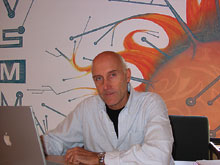Vegetal to virtual conference explores the digital frontier

Professor Hal Thwaites will chair an international conference on multimedia and virtual environments this month.
An international conference on multimedia and virtual environments coming to Montreal will look at everything from vegetal to virtual realities.
The 9th Virtual Systems and Multimedia International Conference will be chaired by Concordia Communication Studies professor Hal Thwaites, who also serves as president of the International Society on Virtual Systems and Multimedia, which is the event’s organizing body.
Thwaites explained that the conference was aimed at advancing international research and co-operation in the field of virtual systems and multimedia, both very broadly defined.
“Since then it’s evolved to encompass many other fields, including cyberanthropology, human factors, and things that revolve around the central theme of virtual systems and multimedia.”
The annual conference alternates between its home in Gifu, Japan, and remote locations around the world, and will be hosted by Hexagram, the Institute for Research and Creation in Media Arts and Technologies, which was jointly founded by Concordia and Université du Québec à Montréal.
This year marks the conference’s first time in Canada, and its theme is Hybrid Reality: Art, Technology and the Human Factor. These are ideas that are hard to define, according to Thwaites. He counts both the low-tech experience of reading a good book and full neural interfaces, such as those depicted in The Matrix, as immersive or hybrid realities.
“It just depends where you draw the boundaries,” he said. “I would call going to a Cirque du Soleil show an immersive environment.
“They take art, combine it with technology, and mix in the human factor in an equation that creates this entirely immersive hybrid reality. You’re seeing something that’s a combination of the best of all of those things put together in a completely new form that totally envelops your mind.”
Fittingly, Cirque du Soleil is a partner in this year’s VSMM and will be presenting a short performance during the conference banquet on Oct. 16. Other partners include Concordia, UQAM, Sony and the Giant Screen Consortium.
Among other things, sessions will deal with virtual reality, holography, technology transfer and commercialization, enhanced environments and mobility, as well as digital entertainment and performance. Underscoring all of these topics is an analysis of the human factor in virtual systems interactions.
Recent developments in networking and information-sharing have given human beings the opportunity to communicate across space and time. Thwaites said that virtual environments, such as videoconferencing, are already going a long way to change the way we communicate.
“This notion of needing to be constantly connected is something that we have to grapple with.” Some of the papers being presented have titles like “Virtual Drama with Intelligent Agents,” “The Immersive Poetics of Artificial Worlds” and “Magic, Real and Virtual Realities.”
“Each presentation probably entails a visualization of the research or some kind of demonstration of an interface, project, product or prototype,” Thwaites said. “The topics range from the very scientific to the very, very artistic.”
About a dozen professors from Concordia and UQAM will be presenting work at the conference. In addition to his other two titles, Thwaites is Research Axis Director of Immersive Environments, Virtual Reality and Audience, at Hexagram.
He may present some of his own work, time permitting, and he is chairing a panel discussion on “How much information is enough?” applied to the field of virtual heritage. There is a strong focus on virtual heritage at the conference, with no less than 29 papers on the subject.
“That’s become a focus at this conference due to an initiative which we’ve established with UNESCO to look at the virtualization — in other words, the virtual representation — of World Heritage Sites that are in danger of disappearing, or that have or will be disappearing shortly,” he said. “It’s a means of preserving and documenting them before they no longer exist.”
VSMM runs from October 15-17 at the Science Centre of Montreal. Check it out at www.vsmm.org/2003.